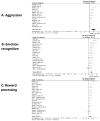Emotion dysregulation in attention deficit hyperactivity disorder
- PMID: 24480998
- PMCID: PMC4282137
- DOI: 10.1176/appi.ajp.2013.13070966
Emotion dysregulation in attention deficit hyperactivity disorder
Abstract
Although it has long been recognized that many individuals with attention deficit hyperactivity disorder (ADHD) also have difficulties with emotion regulation, no consensus has been reached on how to conceptualize this clinically challenging domain. The authors examine the current literature using both quantitative and qualitative methods. Three key findings emerge. First, emotion dysregulation is prevalent in ADHD throughout the lifespan and is a major contributor to impairment. Second, emotion dysregulation in ADHD may arise from deficits in orienting toward, recognizing, and/or allocating attention to emotional stimuli; these deficits implicate dysfunction within a striato-amygdalo-medial prefrontal cortical network. Third, while current treatments for ADHD often also ameliorate emotion dysregulation, a focus on this combination of symptoms reframes clinical questions and could stimulate novel therapeutic approaches. The authors then consider three models to explain the overlap between emotion dysregulation and ADHD: emotion dysregulation and ADHD are correlated but distinct dimensions; emotion dysregulation is a core diagnostic feature of ADHD; and the combination constitutes a nosological entity distinct from both ADHD and emotion dysregulation alone. The differing predictions from each model can guide research on the much-neglected population of patients with ADHD and emotion dysregulation.
Conflict of interest statement
Disclosures. All authors declare no conflict of interest.
Figures



References
-
- Clements S. In: Minimal Brain Dysfunction in Children: terminology and identification: phase one of a three-phase project. US Dept of Health EaW, editor. Washington, DC: 1966.
-
- Thompson RA. Emotion regulation: A theme in search of definition. Monographs of the society for research in child development. 1994;59(2Äê3):25–52. - PubMed
-
- Stringaris A. Irritability in children and adolescents: a challenge for DSM-5. Eur Child Adolesc Psychiatry. 2011;20(2):61–6. - PubMed
-
- Dodge KA, Pepler D, Rubin K. The structure and function of reactive and proactive aggression. The development and treatment of childhood aggression. 1991;16(5):201–18.
Publication types
MeSH terms
Grants and funding
LinkOut - more resources
Full Text Sources
Other Literature Sources
Medical

